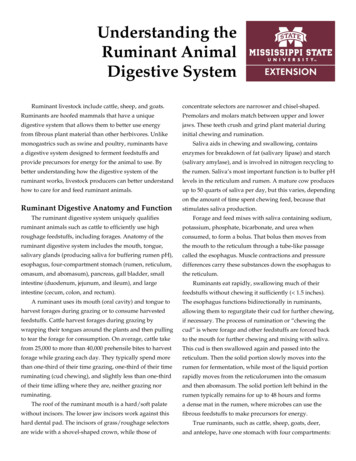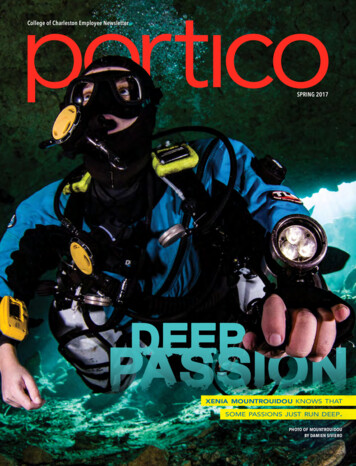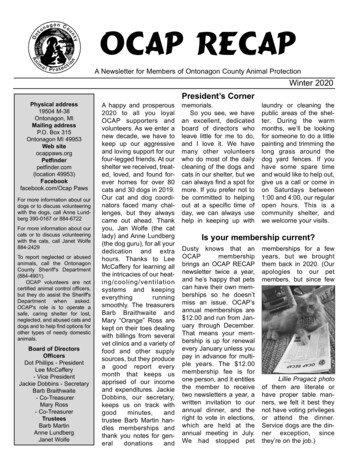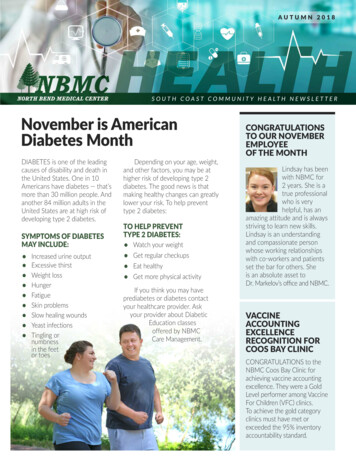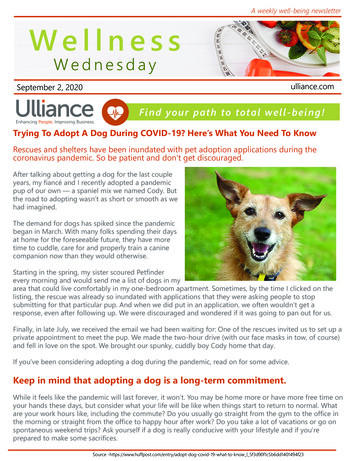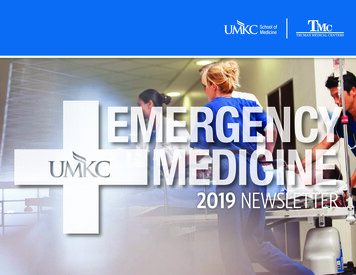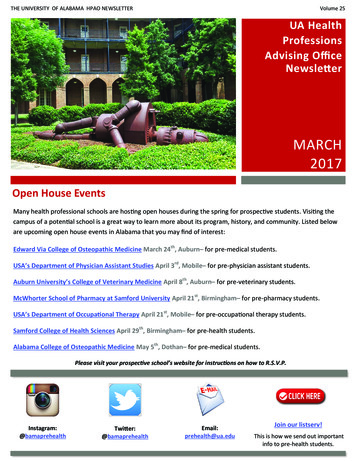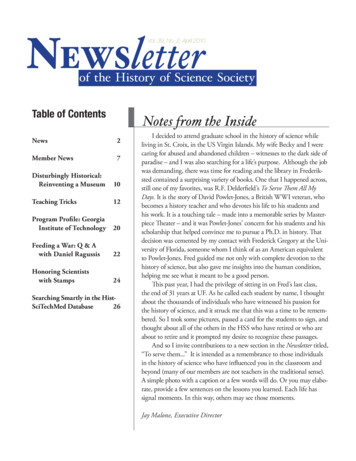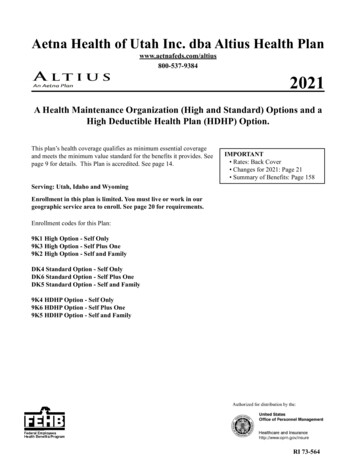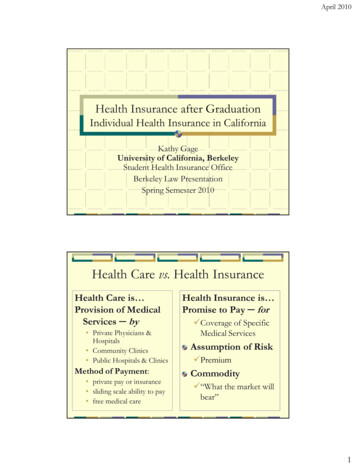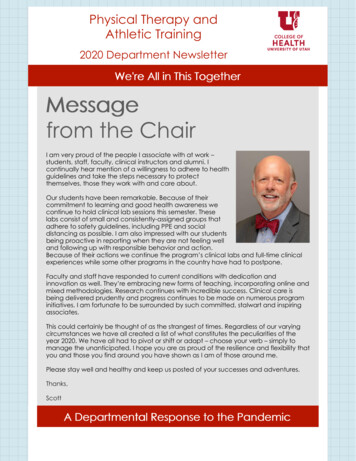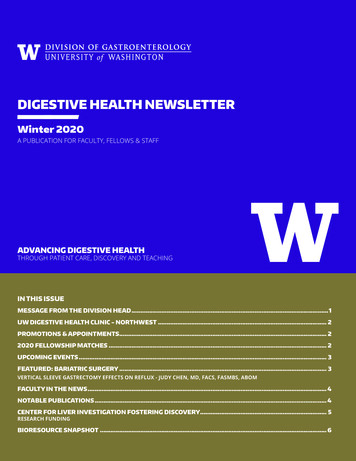
Transcription
DIGESTIVE HEALTH NEWSLETTERWinter 2020A PUBLICATION FOR FACULTY, FELLOWS & STAFFADVANCING DIGESTIVE HEALTHTHROUGH PATIENT CARE, DISCOVERY AND TEACHINGIN THIS ISSUEMESSAGE FROM THE DIVISION HEAD.1UW DIGESTIVE HEALTH CLINIC - NORTHWEST. 2PROMOTIONS & APPOINTMENTS. 22020 FELLOWSHIP MATCHES. 2UPCOMING EVENTS. 3FEATURED: BARIATRIC SURGERY. 3VERTICAL SLEEVE GASTRECTOMY EFFECTS ON REFLUX - JUDY CHEN, MD, FACS, FASMBS, ABOMFACULTY IN THE NEWS. 4NOTABLE PUBLICATIONS. 4CENTER FOR LIVER INVESTIGATION FOSTERING DISCOVERY. 5RESEARCH FUNDINGBIORESOURCE SNAPSHOT. 61
hepatic encephalopathy, improving patient qualityof life while reducing hospital admissions. NIHfunding has also been procured using the resourcesprovided by the GI biorepository and diseaseregistry by Drs. Bill Grady and John Inadomi, anddirected by Wynn Burke. This program continues toenroll patients from our endoscopy units to obtainclinical data, blood, DNA samples and tissue biopsiesfor research questions that are currently beingasked, as well as preparing ourselves for questionsthat we hope to answer in the future.MESSAGE FROM THEDIVISION HEADThe Gastroenterology Divisioncontinues to thrive, succeeding ineach of our three key missions:delivering the highest-quality patientcare, conducting impactful andinnovative research, and providingan ideal environment for educationof medical students, residents and fellows. In thisnewsletter I hope to convey the depth and breadthof achievement of our faculty, trainees and staff, andillustrate the wealth of knowledge and enthusiasmwe have harnessed to make this one of the topDivisions in the country.This July we will welcome 7 new fellows to ourtraining program: Omeed Alipour (UCLA), NaomiChou (Beth Israel/Harvard), Alexander Dao(Georgetown), Nicole de Cuir (Columbia), CaralosMoscoso (UW), Sam Rosenfeld (UW) and ErikSnider (UW). These are the brightest and mostaccomplished physicians from a pool of over 400applicants to our fellowship program, and we areexcited to embark with them upon this educationaljourney.Our faculty and fellows continue to publish inhigh impact journals that truly move the field ofgastroenterology and hepatology forward. Dr. LisaStrate published a study of the epidemiology ofdiverticulitis in the highest impact journal for oursubspecialty, Gastroenterology, and she remainsthe most recognized investigator in this highlyprevalent disease. Dr. Jason Dominitz publisheda comprehensive review of strategies to reducecolorectal cancer mortality, also in the journalGastroenterology. Dr. Rachel Issaka published areview of interventions to improve adherence tocolorectal cancer screening (Preventative Medicine),and Dr. Cynthia Ko published the results of an NIHfunded study comparing screening with colonoscopyversus flexible sigmoidoscopy for the reduction incancer mortality in Plos One. Drs. Kiran Bambhaand Scott Biggins had their study of outcomes aftertransplantation with organs procured after donordeath in the American Journal of Transplantation.I am most pleased to act as the steward for theDivision of Gastroenterology and am tremendouslyproud of the work that the faculty, fellows and staffand produced, and look forward to even greaterachievements in this new decade.Sincerely,John M. Inadomi, MDCyrus E. Rubin Professor & HeadDr. George Ioannou was awarded an NIH R21 tofund his work on developing a mobile app that couldbe used by patients at home to detect minimal1
UWMC DIGESTIVE HEALTH CLINIC - NORTHWESTDEPARTMENT LOCATIONMcMurray Building1536 N 115th StreetSuite 105Seattle, WA 98133-8400PROVIDERSMonday - Friday: 8:00am - 5:00pmCLINIC NUMBERSPhone No: 206-668-8400Fax No: 206-668-1130Back Line No: 206-668-8490CONGRATULATIONS TO OUR 2020FELLOWSHIP MATCHES!PROVIDERSDr. Koch, JohannesDr. Bohorfoush, AnthonyDr. Barahimi, MitraDr. Eugenio, MargaretOMEED ALIPOURUniversity of CaliforniaLos Angeles, CAPROMOTIONSNAOMI CHOUBeth Israel DeaconessBoston, MAMARK DERLETHClinical Associate ProfessorALEXANDER DAOMedstar GeorgetownWashington, DCNEW APPOINTMENTSYI LIUNICOLE DE CUIRColumbia UniversityNew York, NYTeaching AssociateNorthwest HospitalInpatient ServiceMARSHA FIGUEROACARLOS MOSCOSOUniversity of WashingtonSeattle, WATeaching AssociateUniversity of Washington Medical CenterEastside Medical CenterOutpatient ServiceANNE CROGHANSAMUEL ROSENFELDUniversity of WashingtonSeattle, WATeaching AssociateNorthwest HospitalHarborview Medical CenterOutpatient ServiceERIK SNIDERUniversity of WashingtonSeattle, WAANA BACICARNPHarborview Medical CenterOutpatient Service2
UPCOMING EVENTSFEATURED ARTICLEBARIATRIC SURGERYVERTICAL SLEEVE GASTRECTOMYEFFECTS ON REFLUXJUDY CHEN, MD, FACS, FASMBS, ABOMThe most common bariatric operation currentlyperformed is the irreversible and permanentsleeve gastrectomy. If you did not believe thereis a high incidence of Barrett’s esophagus aftersleeve gastrectomy, this multi-center trial mayconvince you: 18.8% incidence from 5 centerswith no Barrett’s preoperatively. The verticalsleeve gastrectomy has surpassed all otherbariatric surgeries as the most commonlyperformed surgery worldwide for many reasons.Favorable features include a better safetyprofile, less nutrition and surgical complicationsand overall better patient acceptance. The riskof gastroesophageal reflux disease continuesto be controversial. There are no standardsfor preoperative counseling. Multiple otherstudies recently published have found a highpost-operativerate of Barrett’s esophagus at 5INTHE NEWSyears, ranging from 15-17.7%. More compellingis that Barrett’s is at times found in otherwiseasymptomatic patients. Symptomatic reflux,therefore, may not be the best symptom to guideworkup or surveillance. So, in comparison to 1.6%Barrett’s prevalence in the general population,it is important to be aware of the potential forsignificantly higher rates after sleeve gastrectomy.Bariatric surgery continues to be the safestand most effective treatment for obesity, butinterdisciplinary care and long-term follow up isessential.APRIL 9 & 10, 2020The 2020 Biennial Microbiome Symposium cohosted by the Fred Hutch Microbiome ResearchInitiative and the CMiST Center for MicrobiomeSciences & Therapeutics is scheduled for April 9 &10. The 2020 symposium will feature presentationsby local and international investigators involvingtherapeutics, HIV and the microbiome, chemistryand the microbiome, models of disease, biostatisticsand computational methods, and the pediatricbiome. Please join us as we communicate newknowledge, develop collaborations, network withcolleagues, and exchange scientific ideas.This symposium is open to faculty, staff, andstudents who hold a position or research affiliationat one of the following organizations: FredHutchinson Cancer Research Center, Universityof Washington, Seattle Children’s, Institute forSystems Biology, Bill & Melinda Gates Foundation,and the Benaroya Research Institute. If the venuereaches maximum capacity, affiliates will have theopportunity to view a live stream of the symposiumin a meeting room on the Fred Hutch campus.Speakers and registration on the website here.MAY 2-5, 2020Digestive Disease Week provides a venue forscientists and clinicians to attend sessions and learnfrom their colleagues and peers through speciallectures and 5,400 abstract-based poster and oralpresentations. Every year it attracts approximately18,000 physicians, researchers, and academics fromaround the world.More info on DDW and UW’s reception here.3
NOTABLE PUBLICATIONSFACULTY IN THE NEWSDR. LISA STRATE:EPIDEMIOLOGY, PATHOPHYSIOLOGY, ANDTREATMENT OF DIVERTICULITISDR. INADOMI NAMED 2019 PHYSICIAN TO KNOWDr. John Inadomi, professor and headof Gastroenterology was listed as oneof 117 GI Physicians To Know in 2019by Becker’s GI and Endoscopy.Strate LL, Morris AMGastroenterology, 2019.PMID: 30660732DR. KIM AND DR. ISSAKA AUTHOR ARTICLE IN“TRANSPLANT INFECTIOUS DISEASE”Read More DR. JOHN INADOMI & DR. RACHEL ISSAKA:WHAT MULTI-LEVEL INTERVENTIONS DOWE NEED TO INCREASE THE COLORECTALCANCER SCREENING RATE TO 80%Dr. Nicole Kim, fellow, is lead author and Dr. RachelIssaka, assistant professor, is senior author of“Disseminated adenovirus infection after autologousstem cell transplant” in Transplant Infectious Disease.Inadomi JM, Issaka RB, Green BBClinical Gastroenterology and Hepatology, 2019.PMID: 31887438Read More DR. BAMBHA’S RESEARCH ONE OF THE MOSTVIEWED UW MEDICINE ARTICLES OF 2019“Patient with bile duct cancer receivesrare transplant” featuring research byDr. Kiran Bambha, associate professor,is one of the three most-viewed UWMedicine Newsroom stories for 2019.DR. JASON DOMINITZ:STRATEGIES FOR COLOCECTAL CANCERSCREENINGLadabaum U, Dominitiz JA, Kahi C, Schoen REGastroenterology, 2020.PMID: 31394032Read More DR. KEARNEY CO-AUTHORS BOOKDr. David Kearney, professor, is coauthor of the book “MindfullnessBased Interventions for Trauma andIts Consequences” published by theAmerican Psychological Association.DR. RACHEL ISSAKA:POPULATION HEALTH INTERVENTIONS TOIMPROVE COLORECTAL CANCER SCREENINGBY IMMOUCHEMICAL TESTS: A SYSTEMATICREVIEWDR. LANDIS PRESENTS ED-BASED STUDY ATANNUAL LIVER DISEASE MEETINGIssaka RB, et al.Preventative Medicine, 2019.PMID: 31367972Dr. Charles Landis presented an EDbased HCV screening program, inwhich Kevin Le and Nicole Kim receivednational recognition, at the annualmeeting of the American Associationfor the Study of Liver Diseases.Read More DR. LIOU GRANTED INAUGURAL FELLOWSTEACHING AWARDDR. CYNTHIA KO:SCREENING COLONOSCOPY VS FLEXIBLESIGMOIDOSCOPY FOR REDUCTION OFCOLORECTAL CANCER INCIDENCE“Dr. Liou works nonstop to provideexceptional patient care while alwaysfinding the time to teach.”Ko CW, et al.PLoS One, 2019.PMID: 31805156- Yana Thaker, MD - GastroenterologyFellowRead More DR. KIRAN BAMBHA & DR. SCOTT BIGGINS:SOLID ORGAN DONATION AFTER DEATH INTHE UNITED STATESDR. TOMIZAWA AWARDED 2020 ASGERESEARCH AWARDBambha K, Shingina A, Dodge JL, O’Connor K,Dunn S, Prinz J, Pabst M, Nilles K, Sibulesky L,Biggins SWAmerican Journal of Transplantation, 2020.PMID: 31917505Read More Dr. Yutaka Tomizawa was granteda 2020 ASGE Research Award forhis project “Risk factors for neoplasiain U.S. patients with gastric intestinalmetaplasia.” The award will includefunding for 2 years.4
CENTER FOR LIVER INVESTIGATION FOSTERING DISCOVERYRESEARCH FUNDINGDR. SCOTT BIGGINSDR. SCOTT BIGGINSROYALTY RESEARCH FUND GRANTKIDNEY PROXIMAL TUBULARSECRETORY CLEARANCE AMONGPATIENTS WITH CIRRHOSISFUNDING FROM VIRGINIACOMMONWEALTH UNIVERSITY &MCGUIRE RESEARCH INSTITUTEMULTI-CENTER STUDY OFOUTPATIENTS WITH CIRRHOSIS:NASCELD IIIThis grant was funded withUWMCDIGESTIVE HEALTH CLINIC - NORTHWESTDr. Bryan Kestenbaum(Nephrology).The project is under the direction of Dr. JasmohanBajaj, MD and looks to define the determinants ofcirrhosis progression using clinical and specializedbiomarkers over time in North America through aprospective outpatient registry.Cirrhosis represents anadvanced stage of liverdisease in which normalfunctioning tissue isreplaced by extensivescarring. Kidney disease is acommon and serious complication of cirrhosis thatinforms disease prognosis and impacts therapeuticdecision-making. Clinical assessment of kidneyfunction in cirrhosis is based on measures ofglomerular filtration, specifically serum creatinineconcentrations and the estimated glomerularfiltration rate (GFR). However, recognizedmechanisms by which liver disease causes aprogressive decline in kidney function involve injuryto the proximal tubular cells of the kidneys.DR. GEORGE IOANNOUR21 GRANTEVALUATING A NOVEL,PORTABLE, SELF-ADMINISTEREDDEVICE (“FLICKER-APP”) THATMEASURES CRITICAL FLICKERACTIVITY FREQUENCY AS ATEST FOR MINIMAL HEPATICENCEPHALOPATHY IN CIRRHOSISWe propose to recruit a nascent cohort of patientswith cirrhosis and compare tubular secretoryclearances to those of patients without knownliver disease. We then propose to evaluate a setof plausible risk factors for impaired secretoryclearance relative to GFR. The proposed studies aredesigned to generate critical preliminary data forfuture grant submissions directed at broadeningand improving the evaluation of kidney functionamong patients with liver disease.This project will demonstratethat the Flicker-App canbe used by patients withcirrhosis for home-based,self-monitoring of CFF, aproven screening test forMHE, and will optimize theprotocol, software, andhardware of the FlickerApp to create a productappropriate for production and distribution topatients. It will also provide the data necessaryto inform the designer of a larger, longer trial incirrhotic patients that investigates the impact ofhome-based, self-monitoring of CFF using theFlicker-App on clinical outcomes such as qualityof life, hospitalizations, accidents, and mortality.Ultimately, we believe that home-based, selfmonitoring of CFF using the Flicker-App willimprove quality of liver and reduce accidents,hospitalizations, and mortality of patients withcirrhosis.5
BIORESOURCE SNAPSHOTGI REPOSITORY AND GI RESEARCHREGISTRIES: ACCELERATINGPRECISION MEDICINE & ADVANCINGLEADING-EDGE RESEARCHThe GI biorepository also includes a living biobankof tissues that features intestinal organoid culturesand is a cutting edge resource that allows theinvestigation of a patient’s response to noveltherapies in the lab. These elements are essentialfor high-quality translational research and areallowing investigators in the UW GI researchcommunity to readily carry-out high-impact studiesusing state-of-the ex vivo model systems.WYNN BURKE & WILLIAM GRADY, MDAs health care transitions toward an era of“precision” diagnostics and treatments, amazingadvances in molecular and cell biology fromthe past decade are dramatically changing ourunderstanding of factors mediating gastrointestinalhealth and disease. Care of patients has becomeincreasingly guided by molecular characterization ofdisease, allowing care providers to more accuratelydiagnose GI illnesses and determine prognosesand more effectively predict the risk of diseaseprogression. While many diseases may appearclinically similar, they often differ at the molecularlevel. These molecular features are showing greatpromise to more accurately predict whetherdiseases will respond to specific therapies than cancurrently be predicted using clinical criteria alone.These newfound subtyping abilities are changingand will change how we treat patients by identifyingthe treatments that have the highest likelihood ofsuccess for a specific patient.A complimentary resource that is also available isa GI Registry, which serves as a means to facilitatethe study of GI diseases. The GI Registry is aresource that has a list of consented subjects whohave agreed to participate in research and whohave granted permission to access their healthinformation in the medical record and to use theirdiscarded, archived tissue samples for studies. Theyhave also agreed to be contacted about emergingresearch opportunities, which removes a majorbarrier to clinical and translational research thatcurrently exists.The GI biorepository and GI Registry are resourcesthat facilitate and accelerate the study of GI diseaseand health. The finely annotated samples in theUW biorepository link demographic information toup-to-date clinical data, which includes exhaustivetreatment information, response to treatment data,and molecular information about the subject’sdisease. This ‘big’ data is critical for high-impacttranslational clinical research and basic scienceresearch that will lead to novel therapies for peoplewith GI disease.Our ability to transfer these advances in ourunderstanding the molecular pathology ofdigestive diseases into the clinic has historicallybeen impeded by a lack of high-quality, clinicallyannotated patient samples. To address this criticalneed in translational research, the UW GI Division,Dr. John Inadomi, and Dr. William Grady, Professorof Medicine at UW and Member of the FredHutchinson Cancer Research Center, establishedthe Gastrointestinal Biorepository and ResearchRegistries over ten years ago.The Biorepository and Subject Registries anchor atranslational research core that actively recruits forinvestigator-initiated, federally-funded and industrysponsored studies. Biospecimens are married topatient data from subjects who have agreed toallow interrogation of their longitudinal healthrecord and to the study of their donated biosamplesin the name of advancing science and ultimatelyimproving patient care. Biospecimens and datacollected with cutting-edge devices are processedusing strict, state-of-the-art protocols ensuring theirlong term viability and future utility in discoveryscience. In addition, study subjects have also agreedto be contacted for new study opportunities, whichaccelerate the pace of clinical and translationalresearch.6
ADVANCINGDIGESTIVE HEALTHTHROUGH PATIENT CARE,DISCOVERY A ND TEACHINGUNIVERSITY OF WASHINGTONDIVISION OF GASTROENTEROLOGY1959 NE PACIFIC STREET, BOX 356424SEATTLE, WA 98195-6424WWW.UWGI.ORG7
Hutchinson Cancer Research Center, University of Washington, Seattle Children’s, Institute for Systems Biology, Bill & Melinda Gates Foundation, and the Benaroya
